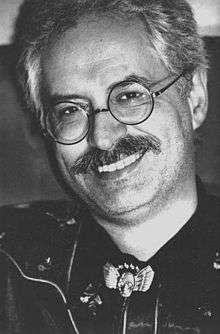Gianfranco Manfredi
Gianfranco Manfredi (born 26 November 1948) is an Italian singer-songwriter, composer, author, screenwriter, actor and cartoonist.
Gianfranco Manfredi | |
|---|---|
 | |
| Born | 26 November 1948 Senigallia, Ancona, Italy |
Life and career
Born in Senigallia, Manfredi graduated in History of Philosophy at the University of Milan with a thesis on Jean-Jacques Rousseau.[1]
He debuted as a singer-songwriter in 1972 with La crisi, an album filled with political and social themes.[1][2] In 1973 he started working at the Italian Institute of History of Philosophy. Since 1974 he was also active as a songwriter for other artists, including Mia Martini, Mina, PFM, Wess & Dori Ghezzi, Drupi, Heather Parisi, Donatello.[2][1]
Starting from the early 1980s Manfredi almost completely abandoned the music to focus on writing. He has then published over a dozen novels and short stories, collaborated in various roles to several films, TV-series and plays, and created several comic series.[2][1] He is also active as a musical critic, and wrote essays on Adriano Celentano, Lucio Battisti, Enzo Jannacci and other Italian music artists.[2][1]
He lives with his wife Mirella in Italy. His first daughter Diana Manfredi is a film director.
Discography
- Album
- 1972 – La crisi
- 1976 – Ma non è una malattia
- 1977 – Zombie di tutto il mondo unitevi
- 1978 – Biberon
- 1981 – Gianfranco Manfredi
- 1985 – Dodici (with Ricky Gianco)
- 1993 – In paradiso fa troppo caldo
Novels
- Magia rossa, Milano, Feltrinelli, 1983. ISBN 88-07-04001-8; Roma, Gargoyle, 2006. ISBN 88-89541-12-1.
- Cromantica, Milano, Feltrinelli, 1985. ISBN 88-07-04007-7; Milano, Tropea, 2008. ISBN 978-88-558-0039-6.
- Ultimi vampiri, Milano, Feltrinelli, 1987. ISBN 88-07-01342-8; extended version, Roma, Gargoyle, 2009. ISBN 978-88-89541-35-7.
- Trainspotter, Milano, Feltrinelli, 1989. ISBN 88-07-01393-2.
- Il peggio deve venire, Milano, Mondadori, 1992. ISBN 88-04-35930-7.
- La fuga del cavallo morto, Milano, Anabasi, 1993. ISBN 88-417-3016-1.
- Una fortuna d'annata, Milano, Tropea, 2000. ISBN 88-438-0135-X.
- Il piccolo diavolo nero, Milano, Tropea, 2001. ISBN 88-438-0256-9.
- Nelle tenebre mi apparve Gesù, Milano, Tropea, 2005. ISBN 88-438-0500-2.
- Ho Freddo, Roma, Gargoyle, 2008. ISBN 978-88-89541-25-8.
- Tecniche di resurrezione, Roma, Gargoyle, 2010. ISBN 978-88-89541-51-7.
- La freccia verde, Milano, Mondadori, 2013. ISBN 978-88-04-62464-6.
References
- Enrico Deregibus. Dizionario completo della Canzone Italiana. Giunti Editore, 2010. ISBN 8809756258. pp. 275–6.
- Enzo Giannelli. "Gianfranco Manfredi". Gino Castaldo (edited by). Dizionario della canzone italiana. Curcio Editore, 1990. pp. 973–4.
External links
- Official website
- Gianfranco Manfredi at AllMusic
- Gianfranco Manfredi discography at Discogs
- Gianfranco Manfredi on IMDb